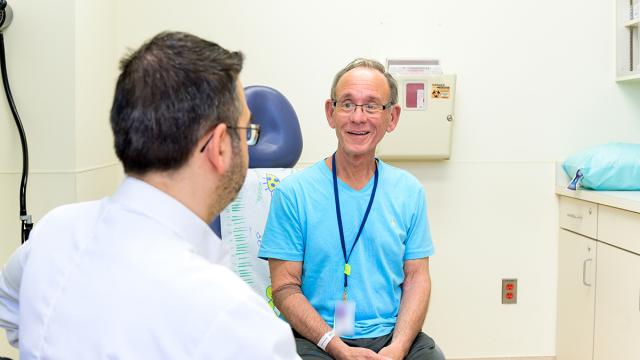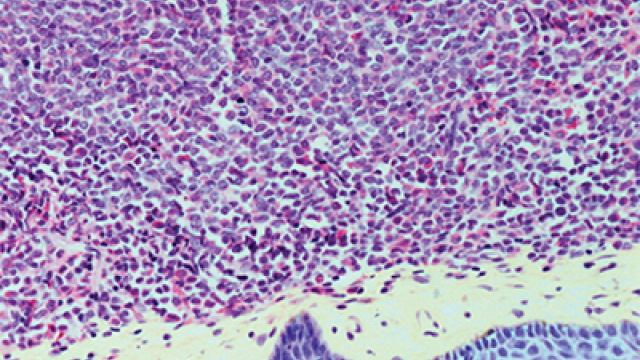A novel gene therapy helps eliminate recurring respiratory growths in patients — and the frequent surgeries they required.

Kim McClellan was diagnosed with RRP when she was just 5 years old. Since then, she has had more than 250 surgeries to manage the condition. Each one has caused anxiety and worry, and has taken time away from the rest of her life. “Even one surgery is too many,” she says. As President of the Recurrent Respiratory Papillomatosis Foundation, Kim is a vocal advocate for patients with the rare disorder. For too long, medical and research communities accepted surgery as the only option for managing RRP. Now, with the development of PRGN-2012 and Dr. Allen’s clinical trials in collaboration with Dr. Norberg, things are finally changing. “I talk to patients daily, and they tell me how it's changed their lives,” she says. “They talk about being able to make plans, their voice coming back stronger, and just the improvement to their quality of life. That's the end game for us: It's ‘Has your life been improved?’ And it has.” This showed in Kim’s smile throughout her son’s wedding weekend in 2023, where this photo was taken.
Credit: Photo courtesy of Kim McClellan; SPGM, FNL, NCI, NIH; Adobe Firefly
For people with a condition called recurrent respiratory papillomatosis (RRP), surgery is an all-too-familiar ordeal. The disease, which affects more than 20,000 adults in the United States, is caused by certain forms of human papillomavirus (HPV) and causes growths to develop in the upper airways, where they can interfere with a person’s voice and make it harder to breathe. In rare cases, the growths can become cancerous. Surgery to remove the growths is a temporary fix, because surgery does not address the underlying cause of the disease and growths almost always come back, but for decades has been the only option for managing RRP.
Many patients with RRP need hundreds of surgeries in their lifetime — but an NCI-led clinical trial suggests that a new experimental gene therapy could change that. The treatment, called PRGN-2012, developed with the cell and gene therapy company Precigen, is designed to direct patients’ immune systems to destroy cells infected by the HPV that causes RRP. In the clinical trials evaluating PRGN-2012, nearly all participants (86%) needed fewer surgeries to manage their disease in the year following treatment than they had in the previous year. More than half needed no surgery at all during the first year of follow-up.
“RRP has always been difficult to treat,” says Senior Investigator Clint Allen, M.D., who, with Associate Research Physician Scott Norberg, D.O., co-led a phase 1/2 trial evaluating PRGN-2012 at the NIH Clinical Center. Allen explains that surgeries to remove RRP-related growths often leave scar tissue that causes many of the same problems as the growths themselves. “If you ask RRP patients what they care about, it’s not having procedures to remove their disease,” he says.
PRGN-2012 helps the immune system eliminate RRP by training T cells to kill cells that have been infected by RRP-associated types of HPV viruses (HPV6 and HPV11). It was inspired by immunotherapies being developed and tested at NCI for the treatment of HPV-related cancers.
Allen says the NIH Clinical Center’s unique resources and expertise in treating RRP patients were vital for completing PRGN-2012 clinical trials in an expedient manner for this major unmet need. After treating 15 patients with PRGN-2012 in a phase 1 clinical trial, Allen and colleagues analyzed participants’ blood and found that 93 percent of patients now had T cells that could recognize HPV-infected cells. For six people, those T cells completely curbed the disease, eliminating the need for surgery in the following year.
Phase 1 results were reported in Science Translational Medicine. Results from the phase 2 portion of the pivotal trial, which demonstrated similar success in a larger group, were subsequently published in Lancet Respiratory Medicine and confirmed the efficacy of the treatment. The treatment was well tolerated by patients and no serious side effects were reported.
Because of its potential impact for patients, PRGN-2012 has been granted Breakthrough Therapy designation and Precigen’s biologics license application (BLA) has been granted priority review by the U.S. FDA. The BLA is currently in review by the FDA and if successful, RRP patients may finally have an FDA-approved therapy that addresses the underlying cause of RRP.



